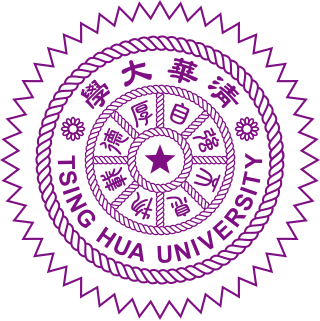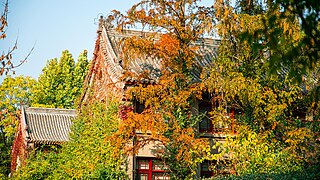Related Research Articles

Peking University is a public research university in Beijing, China. The university is funded by the Ministry of Education of China.

Tsinghua University is a national public research university in Beijing, China. The university is funded by the Ministry of Education.

National Tsing Hua University is a public research university in Hsinchu City, Taiwan.

Yenching University, was a university in Beijing, China, that was formed out of the merger of four Christian colleges between the years 1915 and 1920. The term "Yenching" comes from an alternative name for old Beijing, derived from its status as capital of the state of Yan, one of the seven Warring States that existed until the 3rd century BC.

Beihang University, previously known as the Beijing University of Aeronautics and Astronautics, abbreviated as BUAA or Beihang, is a national public research university located in Beijing, China, specializing in engineering, technology, and the hard sciences.

Feng Youlan was a Chinese philosopher, historian, and writer who was instrumental for reintroducing the study of Chinese philosophy in the modern era. The name he published under in English was 'Fung Yu-lan,' for which see, for example, the Bodde translation of A History of Chinese Philosophy. This earlier spelling also occurs in philosophical discussions, see for example the work of Wing-tsit Chan.

China Agricultural University is a public research university in Beijing, People's Republic of China specializing in agriculture, biology, engineering, veterinary medicine, economics, management, humanities and social science. It was formed in 1995 through the merger of the Beijing Agricultural University and the Beijing Agricultural Engineering University, which evolved from one of the earliest agriculture institutions in China founded in 1905.

Peking Union Medical College, founded in 1906, is a selective public medical college based in Dongcheng, Beijing, China. It is a Chinese Ministry of Education Double First Class University Plan university. The school is tied to the Peking Union Medical College Hospital and has a joint 8-year clinical medicine science program with Tsinghua University.

Tsinghua University High School, or Tsinghua High School for short, is a high school in China, located in Beijing. Based on its current status, a more precise translation should be 'The secondary school affiliated to Tsinghua University'. In a 2016 ranking of Chinese high schools that send students to study in American universities, Tsinghua University High School ranked number 10 in mainland China in terms of the number of students entering top American universities.

The 2001 Summer Universiade, also known as the XXI Summer Universiade, was an international multi-sport event that took place in Beijing, China, between 22 August and 1 September. A total of 6,757 athletes from 165 nations took part in 12 sports. The hosts, China, topped the medal table for the first time, with a total of 103 medals and 54 gold medals.

Beijing 101 Middle School is a public coeducational secondary school in Haidian, Beijing. It offers programs from grades 7 to 12.
The Affiliated High School of Peking University, abbreviated as Běi Dà Fù Zhōng (北大附中) or BDFZ, is a major public high school in Beijing that offers 7th-12th grade education. It is regarded as one of the most prestigious high schools in China. In a 2016 ranking of Chinese high schools that send students to study in American universities, BDFZ ranked high in mainland China in terms of the number of students entering top American universities.

Beijing No. 4 High School, commonly abbreviated as (Beijing) Sizhong, and sometimes referred to as Beijing High School Four (BHSF), is a public beacon high school in Xicheng District, Beijing. It is one of the most prestigious high schools in China. It was established in 1907 as the Shuntian Secondary School, and was later renamed Capital Public No. 4 Secondary School. It took its current name in 1949. The school was among the first to be accredited as a "Municipal Model High School" by the Beijing Municipal Commission of Education. More than 96 percent of its graduates passed the enrollment line of key universities in National Higher Education Entrance Examination. In a 2016 ranking of Chinese high schools that send students to study in American universities, Beijing No. 4 High School ranked number one in mainland China in terms of the number of students entering top American universities, and number four internationally for high schools outside of the United States. James Palmer of Foreign Policy described it as "the rough equivalent of Eton". Many Chinese politicians and their children have attended Beijing No. 4.
Global China Connection or GCC is a student-run 501(c)3 nonprofit organization created for university students and young professionals of all nationalities to encourage China's emergence in the world in a nonpolitical environment. GCC connects future leaders from all nations and assists them in developing the skills and friendships necessary to succeed both in China and internationally. GCC is present in more than 60 top universities in North America, Asia, Europe, and Oceania, including Harvard University, Yale University, Princeton University, University of Pennsylvania, New York University, Columbia University, and Cornell University. With its geographic reach, GCC connects thousands of students, recent graduates, and professionals that are interested in China. Every year, GCC hosts hundreds of local, regional, national, and international events. GCC's main activities include hosting delegations of university students, China-focused social and professional events, and annual summits in China and the United States. The official languages of GCC are English and Mandarin Chinese. Global China Connection was founded in 2008 at Columbia University with a motto "Building relationships that will change the world".
Tsinghua University School of Economics and Management, is the business school of Tsinghua University in Beijing, China. The school offers undergraduate, master, doctoral, and many executive education programs, with a total enrollment of more than 3,000 students.

The Peking University Shenzhen Graduate School is a public research university established as a satellite graduate school of Peking University in 2001 via a joint venture with the Shenzhen Municipal Government. It is situated inside the University Town of Shenzhen, along with the graduate schools of Tsinghua University and the Harbin Institute of Technology. The present chancellor of Peking University Shenzhen Graduate School is Dr. Wu Yundong.
Schwarzman Scholars, founded by American financier and philanthropist Stephen A. Schwarzman, is a one-year fully-funded master's degree leadership program at Tsinghua University in Beijing, China. The program selects 100 - 200 Scholars per year based on their leadership ability, academic achievement, and commitment to advancing mutual cultural understanding and global progress. Selected scholars pursue a one-year master's degree in Global Affairs at Tsinghua University, residing at Schwarzman College.
Li Xueqin was a Chinese historian, archaeologist, and palaeographer. He served as Director of the Institute of History of the Chinese Academy of Social Sciences, Professor of the Institute of Sinology of Tsinghua University, Chairman of the Pre-Qin History Association of China, and participated in the Xia–Shang–Zhou Chronology Project.

The Yenching Academy is a postgraduate college of Peking University, located in Beijing, China. It hosts the Yenching Scholarship, a fully funded prestigious global scholarship program, designed "to cultivate leaders who will advocate for global progress and cultural understanding." The academy offers Yenching Scholars, selected annually from around the world, with full scholarships for one or two years of study leading to a master's degree from Peking University.
The Yenching Scholarship is a prestigious interdisciplinary graduate program at the Yenching Academy of Peking University (PKU) in Beijing, China.
References
http://www.projectimuse.org <p\> Hu, J.C. 2008. Jet Li Fights for Global Teamwork. The Harvard Crimson. http://www.thecrimson.com/article.aspx?ref=521956<p\> [ permanent dead link ] Withers, A. CAMPUS: Panel Betters Western Ties. The McGill Tribune. [ permanent dead link ]